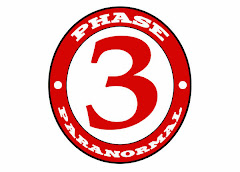What is the first and most important thing all paranormal investigators should do? What is the one thing which no successful investigation can do without?
If you answered anything other than "Helping the client," or something close to that, you are wrong.
Sadly, I feel like a lot of investigators and investigative teams out there go into an investigation looking for either great evidence or an interesting experience above all else. Their client takes a back seat. Perhaps it is not an intentional slight, but it is damaging in the long run. Not just for the team itself, but for the client themselves.
Experienced investigators know that the paranormal does not perform on cue. So going into an investigation expecting great evidence is akin to setting yourself up for disappointment. Secondly, if what an investigator is looking for is an experience, pardon me, but you are in the wrong field. If you want an experience, go to Cedar Point. Go to a strip club. Paranormal investigators; the ones who take it seriously anyway, are in it to help people.
Phase 3 Paranormal investigated a location recently where the client was very shaken by their experiences. Everything from shadowy apparitions, being touched by unseen hands, and seeing solid objects be levitated before their eyes had been reported. No doubt, they were scared. They felt the presence in their home was malicious, harmful. Really, they felt it was evil.
Phase 3 Paranormal is a damn good group. I'm proud to say we are experienced and do solid case work. As of this writing, our evidence review has not shown us anything out of the ordinary present that night. Does that mean the home does not have activity? Are the clients simply crazy? Absolutely not.
So what if we cannot confirm a paranormal presence? What then? Well, first of all, just because we couldn't capture any evidence the night we were there does not mean the place is free of activity. As we explained earlier, the paranormal doesn't perform on cue. And while repeat investigations may be in order for this client, our first and most important job with these people is to help ease their minds. After we leave, they are the ones that have to live in the home with the memories of their experiences in the back of their minds.
While I cannot say now based on Phase 3 Paranormal's findings that we can confirm or deny a paranormal presence, I do have the confidence to say something else: the presence, if indeed there, is not malicious. It is not evil. No one has been injured. This is important to note.
I explain it like this: Let's say there is a ghost in the home. What is a ghost? Let us assume it is the spirit of a once living human being, as most believe. This spirit is trying to communicate. If it is levitating objects and physically touching people, it is likely intelligent. So, how can it intelligently communicate? A ghost does not have vocal cords. It cannot simply sit down and have an intelligent conversation with us. It doesn't have a body, so picking up a pencil and simply writing a note is probably out of the question as well. So, what then, can it do to communicate? It will do anything it can to make itself known. It will touch you if it is able for a brief moment. It will move an object. It wants attention. It wants you to know that it is there.
This can, of course, cause fear in the living. We are not used to seeing objects move or levitate without rational means. We are not accustomed to being touched or grabbed by an unseen hand. Heading to the kitchen to grab a snack during a commercial break of your favorite show and feeling an icy cold touch on your neck can be scary. Seeing your can of soda seemingly knock itself off the counter could be off-putting. It simply isn't an everyday event, so of course it can be alarming.
But what happens to fear when knowledge is brought in to the equation? It disappears. The unknown aspect of the situation flies out the window and that is when acceptance can begin. So, that is where we come in. Even if we cannot confirm the paranormal presence that has been reported doesn't mean it is not there. And if it is there, it is our number one priority to assist the client by eliminating the fear and helping them to accept what is happening by comparing it in a way they can understand and appreciate.
Help first. Evidence later. That is a phrase all paranormal investigators should live by.
Thanks for reading.
Wednesday, June 3, 2009
Subscribe to:
Post Comments (Atom)

No comments:
Post a Comment